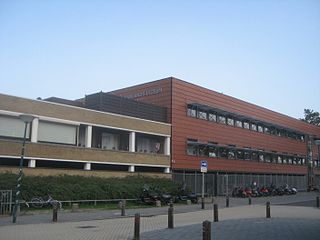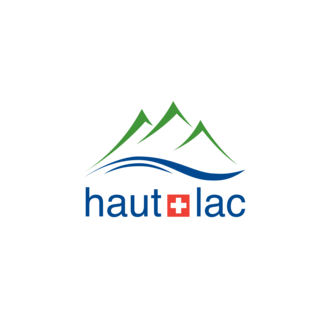A European School is a type of international school emphasising a multilingual and multicultural pedagogical approach to the teaching of nursery, primary and secondary students, leading to the European Baccalaureate as their secondary leaving qualification. Each European School is set up, financed, and operated by the international organisation, the "European Schools", controlled jointly by the member states of the European Union and the European Commission. The schools prioritise, for enrolment purposes, the children of EU staff.
The International School of Havana (ISH) is an international school in Cuba, located in Miramar, Havana.

The International School of The Hague is an international school located in the vicinity of Kijkduin, The Hague.
The European School, Brussels II is one of thirteen European Schools in the European Union (EU), and of four in Brussels. It is situated on Avenue Oscar Jespers, in the Brussels suburb of Woluwe-Saint-Lambert.
The International School Eindhoven (ISE), formerly the International Secondary School of Eindhoven (ISSE), is an international school situated in the northern part of Eindhoven.
The British International School of Jeddah is an international co-educational school established in 1977 in Jeddah, Saudi Arabia.

GESS is an international, multi-lingual, co-educational school in Singapore. GESS provides education to 1,800 students from more than 65 nationalities.
The European School, Luxembourg II (ESL2) is a European School, located on the border of the communes of Bertrange and Mamer in Luxembourg. Founded in 2004, the school prioritises, for enrolment purposes, pupils of EU staff based nearby. It is an all-through school, which offers a multilingual, multicultural education to its pupils, leading to the European Baccalaureate as its secondary leaving qualification.
The Europa School UK is an all-through, free school and IB world school located in Culham near Abingdon in Oxfordshire. It was founded in 2012 by stakeholders of the European School, Culham and subsumed the former school's campus upon its closure in 2017. It now offers the International Baccalaureate Diploma Programme and Middle Years Programme in the secondary section and a bilingual curriculum in primary with English and one of German, French or Spanish. From its foundation until 31 August 2021, it was the only Accredited European School in the United Kingdom. This status was lost due to Brexit.

Het Rijnlands Lyceum Oegstgeest is a secondary school in the town of Oegstgeest in South Holland, founded in 1956.

Stichting The Rijnlands Lyceum Foundation is an educational foundation in the Netherlands encompassing nine different schools; three offering primary education and six offering secondary education. The Foundation, established in 1936, is based in Wassenaar, a suburb of The Hague.
The European School, Brussels III is one of the thirteen European Schools and one of the four located in Brussels. Founded in 1999, it is located in the Brussels municipality of Ixelles (Elsene). The school combines nursery, primary and secondary education, with 3,097 students enrolled at the start of the 2018–2019 academic year, spread over seven language sections. The school priotises the children of European Union (EU) staff for enrolment purposes, with others able to enrol provided there is capacity. Transport links to the school campus include Delta station and Hankar station which provides metro, bus and suburban rail services.
Tallinn European School, or TES, is a private, Accredited European School in Tallinn, Estonia. Founded in 2013, it is an all-through school which offers a multicultural and multilingual education leading to the European Baccalaureate as its secondary leaving qualification. TES is Estonia's largest international school, and the first of the Accredited European Schools, found across the European Union, to be established in the Baltic states.

The British International School Bratislava (BISB), established in 1997, is one of the oldest international schools in Slovakia. The school educates over 770 students between the ages of 3 and 18 years from over 45 countries. BISB educates children at pre-school, primary and secondary level and it is located in Dubravka. The school follows a curriculum based on the National Curriculum of England, International General Certificate in Secondary Education (IGCSE) and the Baccalaureate Diploma Program (IBDP).
Leipzig International School (LIS) is a non-profit co-educational day school for students from age 1 to age 18, in Leipzig, Germany, and was the first international school in central Germany, and is now the largest, with around 1050 students from 77 countries. LIS employs over 190 staff members, from 20 different nationalities. The school's campuses are located in the districts of Plagwitz, and Schleußig. English is the language of instruction at LIS, meaning that all subjects, except for additional languages and German, are taught in English. Leipzig International School is led by Brandie Smith.

The European School of Strasbourg, or EES, is a public Accredited European School in Strasbourg, France. Founded in 2008, it is an all-through school, which offers a multicultural and multilingual education leading to the European Baccalaureate as its secondary leaving qualification.

The European School of Bruxelles-Argenteuil, also known as the EEBA, is a private, Accredited European School located on the grounds of the Château d'Argenteuil, in Waterloo, Wallonia, Belgium. Founded in 2016, the EEBA is a partnership between Brussels private school Lycée Molière, and the Scandinavian School of Brussels (SSB). The EEBA, through its partnership with the SSB, offers its students the International Baccalaureate as its secondary leaving qualification, with plans to also offer the European Baccalaureate in the near future. The school caters to nursery, primary and secondary students and is equipped with facilities for boarders aged 15 and up.

Haut-Lac International Bilingual School is a coeducational international school for ages 3 to 18 years located in Saint-Légier-La Chiésaz, in the canton of Vaud, Switzerland. It was founded in 1993 and originally located in Vevey. About forty-five different nationalities are represented in the student body and the school promotes intercultural awareness and sensitivity. Haut-Lac provides academic instruction in both English and French. Students are encouraged to become bilingual, benefiting from a selection of courses in both languages.
Students wear uniform and are grouped vertically in four Houses for sporting and other competitions.

The European Schools is an intergovernmental organisation, which has established, financed, and administered a small group of multilingual international schools, bearing the title "European School", which exist primarily to offer an education to the children of European Union (EU) staff; offers accreditation to other schools, bearing the title "Accredited European School", under national jurisdiction within EU member states to provide its curriculum; and oversees the provision of the secondary school leaving diploma, the European Baccalaureate.

The European School of Paris-La Défense is a public Accredited European School in the business district of La Défense near Paris, France. Founded in 2019, it is an all-through school, which offers a multicultural and multilingual education leading to the European Baccalaureate as its secondary leaving qualification.











